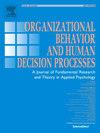Scarcity undermines directed attention and pleasurable thinking
IF 3.8
2区 管理学
Q2 MANAGEMENT
Organizational Behavior and Human Decision Processes
Pub Date : 2025-09-20
DOI:10.1016/j.obhdp.2025.104449
引用次数: 0
Abstract
Thinking for pleasure, including fantasies and imagination, can be a source of joy, relaxation, and a mental escape from everyday adversity. We demonstrate that people intuitively expect those in poverty, who presumably have less access to other forms of welcome escape, to be better able and more highly motivated to find pleasure in imagination and fantasy (Study 1). Yet, thinking for pleasure involves the effortful direction of attention. We argue that persistent financial concerns can impair directed attention and thus interfere with pleasurable thinking. Using cross-sectional and longitudinal approaches, we first establish an association in everyday life between financial concerns and self-reported difficulty in directed attention and pleasurable thinking (Studies 2–3). In a subsequent experiment (Study 4), participants engage in pleasurable thinking experiences accompanied by lexical decision tasks. We find that, when financial concerns are salient, perceived financial scarcity predicts faster responses to money-related stimuli, slower responses to stimuli related to pleasurable thinking experiences, and a less pleasurable experience overall. Perceived financial scarcity appears to undermine the potential entertainment or relief that imagination can bring. Because imaginative thought underlies creativity and problem-solving, the attentional cost of financial constraint may impair performance in cognitively demanding roles. Our research adds to models linking compensation and performance, suggesting that reducing financial constraint may boost not only motivation, but also cognitive resources essential for innovation and productivity. For those experiencing persistent financial scarcity, intentional thinking, joyful as it can be, may prove a less effective tool for finding pleasure in work and daily life.
稀缺性破坏了定向注意力和愉快的思考
为快乐而思考,包括幻想和想象,可以是快乐、放松和逃避日常逆境的精神源泉。我们证明,人们本能地期望那些贫困的人,他们可能很少有机会获得其他形式的欢迎逃避,更有能力和更有动力在想象和幻想中找到快乐(研究1)。然而,为快乐而思考涉及到注意力的努力方向。我们认为,持续的财务担忧会损害定向注意力,从而干扰愉快的思考。使用横断面和纵向方法,我们首先在日常生活中建立了财务问题与自我报告的定向注意困难和愉快思考之间的联系(研究2-3)。在随后的实验(研究4)中,参与者参与了伴随词汇决策任务的愉快思考体验。我们发现,当财务问题突出时,感知到的财务稀缺性预示着对与金钱相关的刺激的反应更快,对与愉快的思考体验相关的刺激的反应更慢,以及总体上更不愉快的体验。感知到的经济匮乏似乎破坏了想象力可能带来的潜在娱乐或解脱。因为想象力是创造力和解决问题的基础,财务约束的注意力成本可能会损害在认知要求较高的角色中的表现。我们的研究补充了薪酬与绩效挂钩的模型,表明减少财务约束不仅可以提高动机,还可以提高创新和生产力所必需的认知资源。对于那些持续经历资金短缺的人来说,有意识的思考,尽管可能很快乐,但可能不是在工作和日常生活中寻找快乐的有效工具。
本文章由计算机程序翻译,如有差异,请以英文原文为准。
求助全文
约1分钟内获得全文
求助全文
来源期刊
CiteScore
8.90
自引率
4.30%
发文量
68
期刊介绍:
Organizational Behavior and Human Decision Processes publishes fundamental research in organizational behavior, organizational psychology, and human cognition, judgment, and decision-making. The journal features articles that present original empirical research, theory development, meta-analysis, and methodological advancements relevant to the substantive domains served by the journal. Topics covered by the journal include perception, cognition, judgment, attitudes, emotion, well-being, motivation, choice, and performance. We are interested in articles that investigate these topics as they pertain to individuals, dyads, groups, and other social collectives. For each topic, we place a premium on articles that make fundamental and substantial contributions to understanding psychological processes relevant to human attitudes, cognitions, and behavior in organizations. In order to be considered for publication in OBHDP a manuscript has to include the following: 1.Demonstrate an interesting behavioral/psychological phenomenon 2.Make a significant theoretical and empirical contribution to the existing literature 3.Identify and test the underlying psychological mechanism for the newly discovered behavioral/psychological phenomenon 4.Have practical implications in organizational context

 求助内容:
求助内容: 应助结果提醒方式:
应助结果提醒方式:


